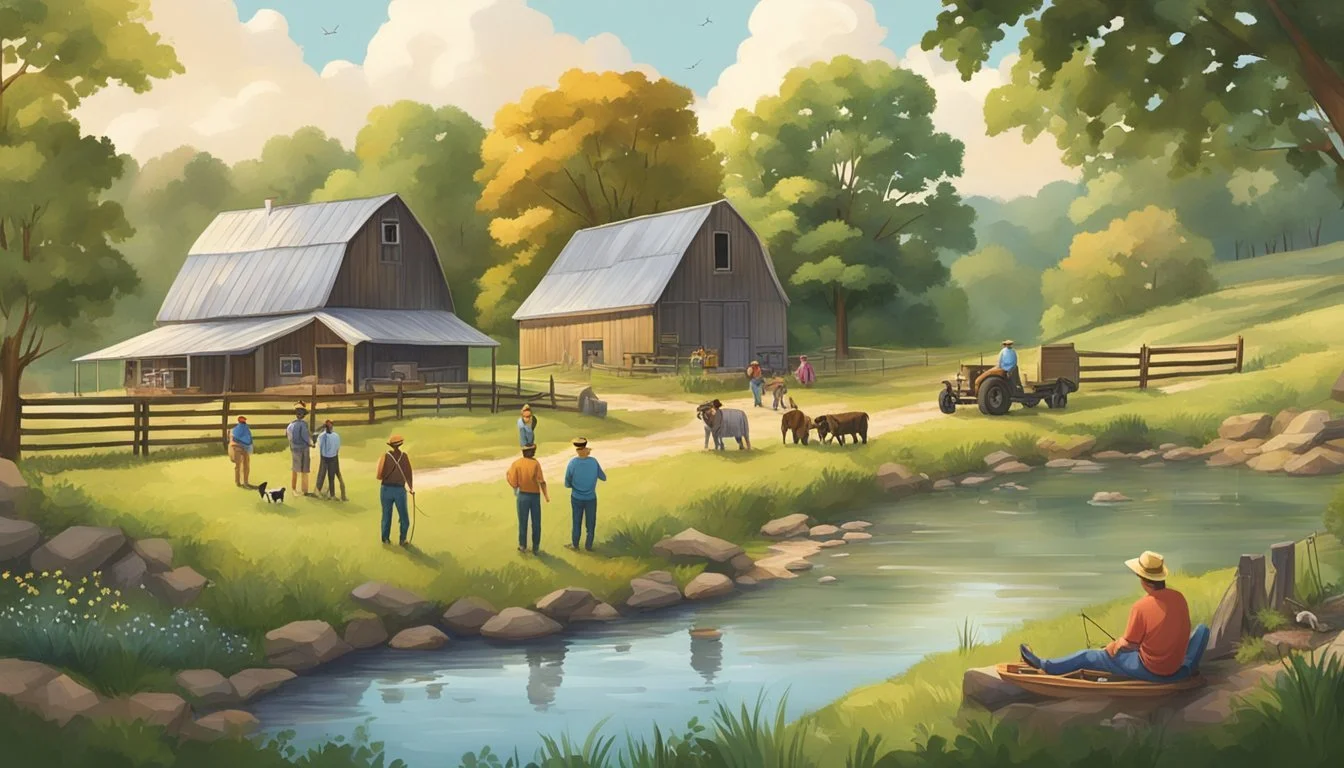Agritourism in Missouri
Discover the Heartland's Harvests and Heritage
Agritourism in Missouri is an expanding sector that offers a unique intersection of agriculture and tourism, providing visitors with authentic experiences on farms, orchards, and rural landscapes. As the state's diverse agricultural offerings blend with tourism, agritourism becomes a conduit for education, entertainment, and connection to farming heritage. This industry supports farmers and ranchers looking for additional revenue streams and creates opportunities for people to engage directly with the sources of their food and the natural environment.
The state's various agritourism attractions range from farm tours to pick-your-own produce activities, extending to farm-to-table dining experiences. Missouri's rich agricultural history is showcased through these immersive activities, which also serve to educate the public on farming practices and rural life. By combining the allure of the countryside with the educational aspects of agricultural operations, agritourism generates a mutually beneficial relationship between producers and visitors.
Missouri Farm Bureau and the Office of the Missouri Lieutenant Governor have acknowledged agritourism's importance to the state's economy. Initiatives like the cost-share program for agritourism highway signing are set up to enhance visibility for agritourism businesses. These efforts reflect an understanding that Missouri's agritourism not only boosts the rural economy but also strengthens the connection between the state's agricultural heritage and the general public.
The Essence of Agritourism in Missouri
Agritourism in Missouri weaves together the state's rich agricultural heritage with unique visitor experiences, bolstering the rural economy and educating the public.
Defining Agritourism
Agritourism represents the intersection of agriculture and tourism, offering an immersive experience for visitors to engage with farm activities. It includes a broad range of attractions such as farm stays, u-pick fruit operations, and educational farm tours. In Missouri, agritourism provides an opportunity for tourists to witness the workings of farms and rural life first-hand.
Missouri's Agricultural Heritage
Missouri's agricultural heritage is robust, rooted in diverse enterprises ranging from crop farming to cattle ranching. The state's farms serve as a testament to a long-standing tradition of agriculture, which forms an integral component of its economy and history. Agritourism allows visitors to explore this heritage, turning Missouri's rural landscapes into hubs of learning and discovery.
The Importance of Agritourism for Missouri
Agritourism holds significant importance for Missouri, offering economic and educational benefits. It allows farmers and ranchers to supplement their income by attracting visitors and helps to increase farm profits, which can be critical for small-scale producers. Additionally, agritourism in Missouri bridges the gap between urban and rural worlds, offering the general public a chance to connect with agricultural practices and understand where their food originates.
Key Attractions in Missouri Agritourism
Missouri offers a rich tapestry of agritourism destinations, blending entertainment with education. Visitors can immerse themselves in the state’s agricultural heritage, enjoy hands-on activities, and embrace the natural beauty of rural landscapes.
Famous Farms and Ranches
Shatto Milk Co. near Osborn stands out for its dedication to dairy production and the visitor experience. Tourists can observe milking processes and sample award-winning products. Green Dirt Farm in Weston allows guests to taste artisan cheeses and yogurts made from sheep's milk.
Fischer Farms and The Branch Ranch are notable for their authentic ranch experiences.
Shryock’s Farm in Columbia and Persimmon Hill Farm in Lampe showcase the diversity of Missouri farming.
Unique Farm Experiences
Missouri agritourism isn't limited to traditional farm tours.
Fahrmeier Farms in Lexington specializes in U-pick berries, offering a hands-on approach to agriculture.
Long Row Lavender in Wright City provides a tranquil setting where visitors can explore lavender fields and enjoy the fragrant blooms.
Seasonal Activities and Events
During the fall, pumpkin patches and corn mazes become quintessential Missouri experiences.
Shryock’s Farm features an intricate corn maze, perfect for families seeking a fun challenge.
Many farms host harvest festivals with hayrides, games, and local produce, spotlighting Missouri’s seasonal bounty.
Agritourism for Family Fun
Family-centered activities are plentiful across Missouri’s agritourism sites.
Petting zoos provide interactive experiences with animals.
Lazy L Safari Park in Cape Girardeau introduces children to over 50 species of exotic animals, fostering both wonder and education.
From picking fresh produce to exploring the daily life on a family farm, these destinations offer enriching experiences for all ages.
Educational Opportunities
In Missouri, agritourism is not only a way to experience rural life but also serves as a platform for a wide array of educational opportunities. From farm visits to academic partnerships and engaging workshops, visitors of all ages have the chance to deepen their understanding of agriculture.
Agricultural Education for Visitors
Missouri's agritourism destinations cater to educational needs by offering hands-on experiences to visitors. The Missouri Farm Bureau focuses on facilitating opportunities for visitors to learn directly from working farms. These experiences are designed to provide insight into the day-to-day operations of farms and the significance of agriculture in everyday life. Educational tours and farm-to-table events are part of the services offered by some farms, connecting consumers with the origin of their food.
University Partnerships and Programs
The University of Central Missouri plays a vital role in supporting agritourism through academic partnerships. These collaborations often result in programs that bridge the gap between theoretical knowledge and practical farming. Students and the public can participate in diverse educational initiatives ranging from sustainable agriculture practices to agribusiness management.
Workshops and Conferences
Missouri is home to various workshops and conferences related to agritourism. These events serve as a congregating point for farmers, educators, and enthusiasts to exchange ideas and best practices. Regularly held conferences also discuss the economic impact of agritourism, new trends in the industry, and the importance of safety practices on farms. These gatherings are instrumental in fostering a community that is well-informed about agricultural innovations and techniques.
Culinary and Produce Exploration
Missouri offers a rich tapestry of agricultural experiences that connect visitors directly with the sources of their food. From the opportunity to pick ripe, juicy fruits straight from the branch to the chance to sample artisan cheeses and purchase farm-fresh produce, the state's agritourism invites one to indulge in its local bounty.
Orchard Tours and Fruit Picking
Visitors to Missouri's orchards can expect to find a variety of apples and other fresh produce available for picking. Orchard tours offer educational insights into sustainable farming practices and often conclude with the chance to make and taste freshly-pressed apple cider. This hands-on approach not only allows for a deeper connection with agriculture but also provides a fun, family-friendly activity.
Long Row Lavender, Wright City: Open Wed.-Sat., book tours for groups of 10 or more.
In Bloom: Peak times include June and September for lavender.
Dairy and Cheese Tastings
The state's dairy farms open their gates to those interested in understanding the journey from cow to cheese. Guided tastings showcase the variety and complexity of local cheeses and often pair them with regional wines. This not only educates the palate but supports the relationship between local farms and culinary excellence.
Cheese Samples: Handcrafted artisan cheeses with unique local flavors.
Farmers Markets and Farm-to-Table
Missouri's farmers markets are the heartbeat of its local agriculture, bustling with vendors selling everything from organic vegetables to homemade jams. These markets serve as a direct link to farm-to-table experiences, where consumers can engage with growers and savor the true taste of the region. The produce here is often at its freshest, with seasonal offerings shaping the culinary landscape.
Local Produce: A diversity of fruits and vegetables, reflecting Missouri's agricultural variety.
Farm-to-Table Meals: Restaurants highlight seasonal, locally-sourced ingredients.
Outdoor and Nature-Based Activities
Agritourism in Missouri offers an abundance of outdoor and nature-based activities that cater to a variety of interests, from serene nature trails to picturesque outdoor venues suitable for events. Visitors can engage with the land directly through hikes, hayrides, and interactions with wildlife, or enjoy the ambiance of a Missouri winery set amidst the rural landscape.
Nature Trails and Wildlife
Missouri's agritourism destinations often include nature trails that meander through lush landscapes, offering visitors a chance to experience the area's natural beauty and observe local wildlife. Hiking trails like those connecting to Wilson's Creek National Battlefield allow for both historical exploration and nature observation. Here are some activities to look for:
Corn Mazes: Navigable labyrinths that double as fun and interactive walks through nature.
Hayrides: A leisurely way to see the farmland and the surrounding scenery while learning about local agriculture.
Wildlife Spotting: Opportunities to see and learn about the native species, which can include birds, deer, and small mammals.
Outdoor Venues for Events
The agritourism sites in Missouri also boast outdoor venues that serve as perfect backdrops for events ranging from weddings to wine tastings. These venues highlight the state's natural and cultivated landscapes:
Missouri Wineries: Many wineries offer outdoor spaces for visitors to enjoy wine amid the vines.
Farm Events: Spaces like barns or green fields accommodate seasonal celebrations, educational tours, and community gatherings.
Each venue provides a unique experience that showcases Missouri's dedication to integrating agriculture with leisure and education.
Agritourism Development and Opportunities
Agritourism in Missouri offers unique prospects for agricultural businesses seeking diversification and growth. This section discusses strategies for expanding agricultural operations, engaging young farmers, and effectively marketing agritourism destinations.
Business Diversification Strategies
Agritourism presents Missouri farmers with an avenue to diversify their income streams. By integrating tourism with agriculture, farmers can capitalize on the scenic and recreational value of their land while enhancing their main agricultural business. This strategy not only boosts revenue but also mitigates risk by reducing dependency on a single source of income.
Diversification methods include:
Adding value-added products (e.g., farm-to-table produce)
Establishing on-farm attractions (e.g., corn mazes, hayrides)
Hosting events and workshops (e.g., cheese-making classes)
Supporting the Next Generation of Farmers
The Missouri Department of Agriculture recognizes the potential of agritourism to operate as a platform for the next generation of farmers. Agritourism can serve as an entry point for young entrepreneurs keen to marry traditional farming with modern business models, technology, and direct consumer engagement.
Initiatives to support young farmers include:
Educational programs and mentorships on agritourism best practices
Grants and financial incentives
Networking events to connect novice farmers with experienced mentors
Marketing Agritourism Destinations
Effective marketing is crucial for the success of agritourism venues in Missouri. The goal is to attract visitors both locally and outside the state by highlighting the unique experiences that Missouri farms offer.
Key marketing strategies involve:
Utilizing social media to showcase real-time farm experiences
Engagement with tourism boards for broader promotion
Partnerships with local businesses to create bundled visitor packages
Using targeted marketing, agritourism businesses can effectively convey the authenticity of the farm experience and the value of agricultural education provided at these venues.
Challenges and Considerations
In the realm of Missouri agritourism, two significant considerations are integral to a farm's operational success: safety and risk management and regulatory compliance and zoning. These factors are pivotal and require thorough attention and strategic planning for agritourism enterprises.
Safety and Risk Management
Adhering to strict safety protocols is essential in agritourism to protect both visitors and staff. Missouri farms engaging in agritourism must establish and communicate clear safety guidelines for activities like hayrides, animal interactions, and on-farm equipment demonstrations. Risk management strategies often include:
Routine safety inspections to ensure that facilities and equipment are functioning correctly.
Training employees on emergency procedures and first aid.
Providing clear signage for potential hazards and establishing restricted areas for guest protection.
Ensuring that all activities are appropriately supervised by trained personnel.
Regulatory Compliance and Zoning
Agritourism businesses in Missouri must navigate a complex landscape of local and state regulations. Key zoning considerations include:
Land use regulations, which dictate the types of activities that can occur on agricultural land.
Permitting processes for structural modifications needed to accommodate agritourism activities.
Adherence to health and safety codes, especially if the farm offers food services or engages in food processing.
Compliance with the Americans with Disabilities Act for public accessibility.
Farms must work closely with local government officials to understand and meet these requirements, which may vary significantly by locality.







